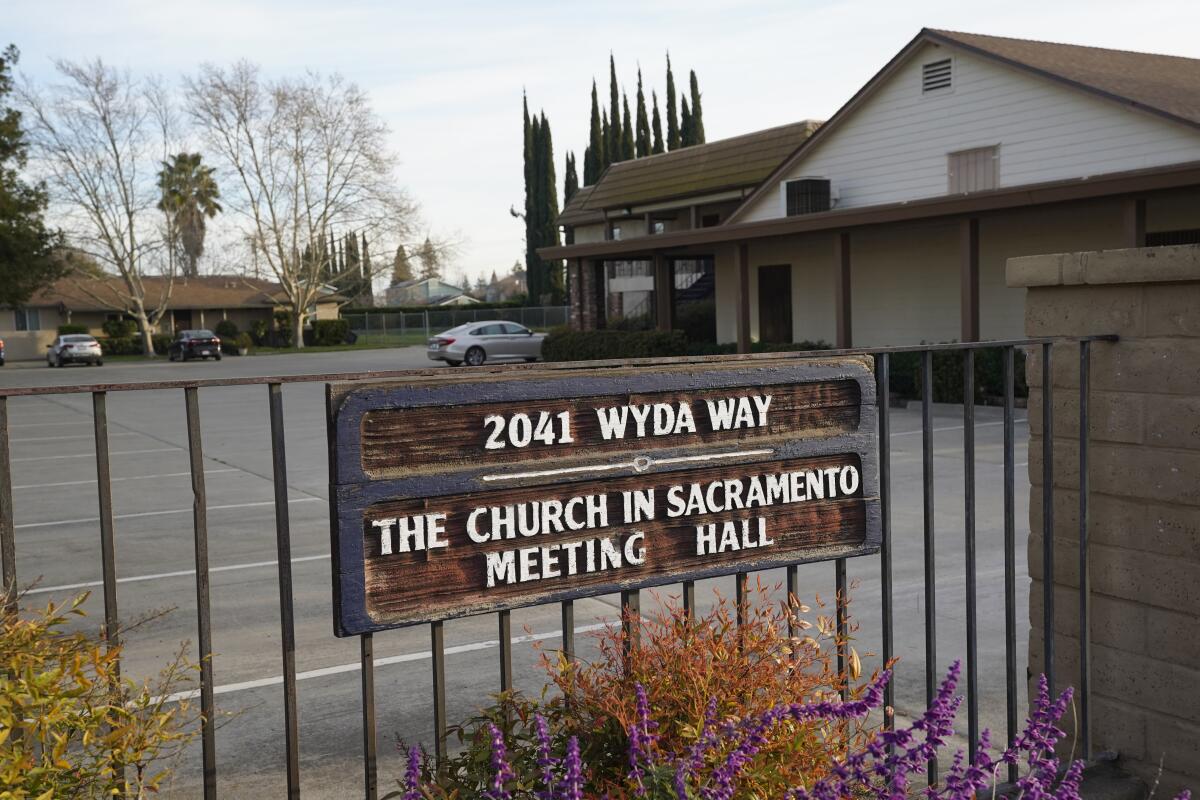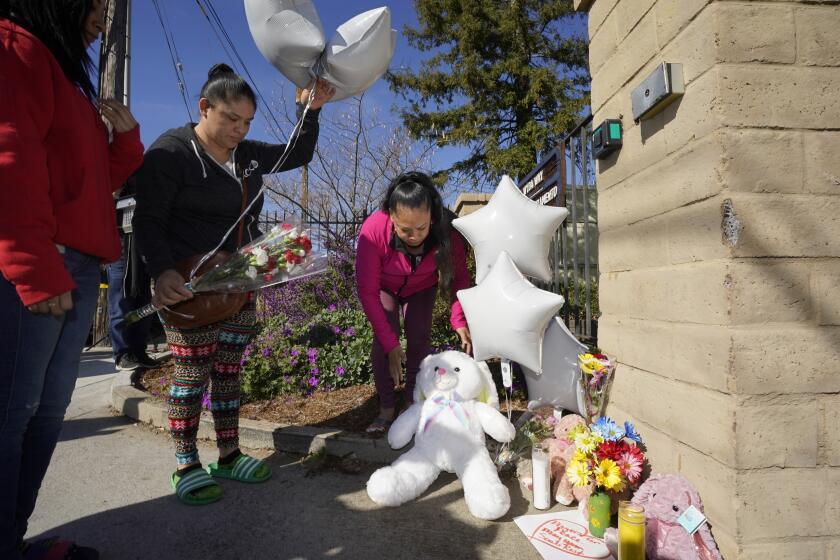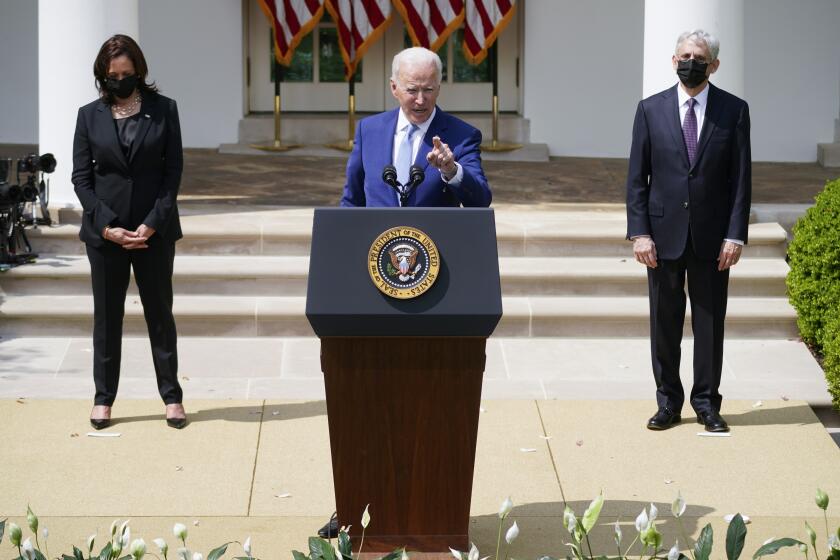Domestic abusers still have access to guns. That has got to change

- Share via
Seven months before a man shot and killed his three daughters and a family friend in a Sacramento church last week, a man in Kern County shot and killed his wife, two sons and a sheriff’s deputy responding to violence at their home. In July 2020, a Madera County man shot and killed his wife as she was putting their three children in her minivan. And in November 2019, a San Diego man shot and killed his wife and four sons, ranging in age from 3 to 11.
The only thing more horrific than any one of these murders is the fact that our society has allowed them to pile up, year after year, to form a sickening pattern: innocent children and vulnerable women killed despite having turned to courts and law enforcement for protection.
Before these four men became killers, all of them were abusers with a documented history of violence against their family members. All of them were subject to restraining orders that prohibited them from possessing guns. And yet, because of California’s lax enforcement of gun prohibitions, and the availability of “ghost guns” and illegal firearms, people who were known to be dangerous were able to kill.
About 24,000 Californians the attorney general’s office knows about possess guns and legally shouldn’t, but it can’t recruit enough officers to make a dent in the list, columnist George Skelton writes.
The broader picture is that in the period between 2010 and 2019 in California, at least 1,126 homicides involved domestic violence. And research shows that a woman is five times more likely to be murdered when her abuser has access to a gun.
No single solution will stop this carnage. But California can and must do more to protect the vulnerable by keeping guns away from people subject to domestic violence restraining orders.
Details differ, of course, in the four cases. But at least one of these shootings could have been prevented by enforcing laws already on the books. In the Madera County case, the man’s wife informed the court that he had a gun and provided details of him threatening her with it in an application for a restraining order, CalMatters reported last year. Yet the judge accepted the man’s answer of “No” when asked whether he had any firearms.
The state must do more to stop dangerous people from having guns. It’s shameful that California essentially relies on an honor system asking domestic abusers to relinquish their weapons. Courts should more consistently investigate whether domestic abusers own guns at the time they issue restraining orders, and they should be equipped with the technology needed to consistently report restraining orders to the statewide database. When judges learn that an abuser has firearms, they must come up with a plan to enforce the restraining order’s requirement to surrender them.
Local officers who serve restraining orders could be trained to confiscate weapons, facilitate their sale to a legal gun dealer or even just talk to the subject about the requirement to relinquish them. A pilot project testing this approach in two Northern California counties found that officers safely recovered 665 weapons over three years. They took firearms from only about a quarter of the people subject to domestic violence restraining orders who were known to have guns, but — importantly — they did it without any serious violence or injuries. The other people either were not served or denied having weapons — shortcomings that must be addressed if the state resurrects this approach.
The executive actions seek to address the proliferation of guns and gun violence, but the most meaningful reforms will require congressional action.
The state also needs to beef up its Department of Justice operation that seizes guns from people who are prohibited from having them. The “Armed Prohibited Persons System” is a set of databases listing people who are supposed to surrender their weapons for a variety of reasons — including restraining orders, felony convictions and mental illness. The state knows who they are and employs special agents to take their weapons. But it can’t keep up with the ever-growing list. At the start of last year, the backlog had grown to nearly 24,000 people — a 29% increase from a decade earlier.
The state’s Little Hoover Commission last year identified key problems contributing to the backlog: a cumbersome and outdated computer system and a shortage of agents performing this dangerous but critical job. Yet these are solvable problems that Atty. Gen. Rob Bonta should prioritize.
A more challenging problem is the proliferation, especially in California, of ghost guns — untraceable weapons that are sold in kits with parts lacking serial numbers. Because they’ve been classified as components, not guns, buyers haven’t had to register these weapons or undergo background checks. That makes them appealing to people who can’t legally buy guns — such as domestic abusers. A ghost gun was the weapon used by the man who killed his three daughters in Sacramento last week.
President Biden directed the federal government to close the loopholes on ghost guns by basically treating them like regular guns, requiring engraved serial numbers on core components and background checks for buyers. That’s a good start. It’s also good to see local governments banning ghost guns and suing manufacturers, state officials allowing ghost guns to be taken from people with domestic violence restraining orders and federal authorities launching special teams to go after ghost-gun makers.
But we need more action to get ghost guns out of our communities and away from dangerous people. California could confiscate more ghost guns by adding agents to the state Department of Justice program that seizes weapons from prohibited owners. Though ghost guns are not in the state database, agents can seize them if they’re discovered when they show up to take registered guns.
California may lead the nation with progressive gun control laws, but they are merely symbolic without enforcement. It’s past time to get guns out of the hands of domestic abusers.
More to Read
A cure for the common opinion
Get thought-provoking perspectives with our weekly newsletter.
You may occasionally receive promotional content from the Los Angeles Times.











